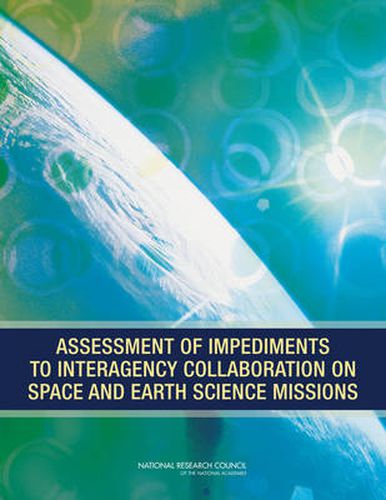Readings Newsletter
Become a Readings Member to make your shopping experience even easier.
Sign in or sign up for free!
You’re not far away from qualifying for FREE standard shipping within Australia
You’ve qualified for FREE standard shipping within Australia
The cart is loading…






Through an examination of case studies, agency briefings, and existing reports, and drawing on personal knowledge and direct experience, the Committee on Assessment of Impediments to Interagency Cooperation on Space and Earth Science Missions found that candidate projects for multiagency collaboration in the development and implementation of Earth-observing or space science missions are often intrinsically complex and, therefore costly, and that a multiagency approach to developing these missions typically results in additional complexity and cost. Advocates of collaboration have sometimes underestimated the difficulties and associated costs and risks of dividing responsibility and accountability between two or more partners; they also discount the possibility that collaboration will increase the risk in meeting performance objectives. This committee’s principal recommendation is that agencies should conduct Earth and space science projects independently unless: It is judged that cooperation will result in significant added scientific value to the project over what could be achieved by a single agency alone; or unique capabilities reside within one agency that are necessary for the mission success of a project managed by another agency; or the project is intended to transfer from research to operations necessitating a change in responsibility from one agency to another during the project; or there are other compelling reasons to pursue collaboration, for example, a desire to build capacity at one of the cooperating agencies. Even when the total project cost may increase, parties may still find collaboration attractive if their share of a mission is more affordable than funding it alone. In these cases, alternatives to interdependent reliance on another government agency should be considered. For example, agencies may find that buying services from another agency or pursuing interagency coordination of spaceflight data collection is preferable to fully interdependent cooperation. –Publisher’s descripiton.
$9.00 standard shipping within Australia
FREE standard shipping within Australia for orders over $100.00
Express & International shipping calculated at checkout
Stock availability can be subject to change without notice. We recommend calling the shop or contacting our online team to check availability of low stock items. Please see our Shopping Online page for more details.
Through an examination of case studies, agency briefings, and existing reports, and drawing on personal knowledge and direct experience, the Committee on Assessment of Impediments to Interagency Cooperation on Space and Earth Science Missions found that candidate projects for multiagency collaboration in the development and implementation of Earth-observing or space science missions are often intrinsically complex and, therefore costly, and that a multiagency approach to developing these missions typically results in additional complexity and cost. Advocates of collaboration have sometimes underestimated the difficulties and associated costs and risks of dividing responsibility and accountability between two or more partners; they also discount the possibility that collaboration will increase the risk in meeting performance objectives. This committee’s principal recommendation is that agencies should conduct Earth and space science projects independently unless: It is judged that cooperation will result in significant added scientific value to the project over what could be achieved by a single agency alone; or unique capabilities reside within one agency that are necessary for the mission success of a project managed by another agency; or the project is intended to transfer from research to operations necessitating a change in responsibility from one agency to another during the project; or there are other compelling reasons to pursue collaboration, for example, a desire to build capacity at one of the cooperating agencies. Even when the total project cost may increase, parties may still find collaboration attractive if their share of a mission is more affordable than funding it alone. In these cases, alternatives to interdependent reliance on another government agency should be considered. For example, agencies may find that buying services from another agency or pursuing interagency coordination of spaceflight data collection is preferable to fully interdependent cooperation. –Publisher’s descripiton.